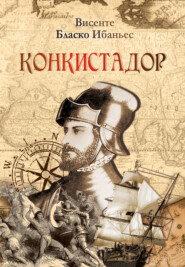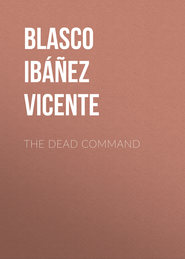По всем вопросам обращайтесь на: info@litportal.ru
(©) 2003-2024.
✖
Mare Nostrum (Our Sea)
Настройки чтения
Размер шрифта
Высота строк
Поля
The Triton went on enumerating to his nephew the class and specialty of every kind of vessel; and upon discovering that Ulysses was capable of confusing a brigantine with a frigate, he would roar in scandalized amazement.
"Heavens! Then what in the devil do they teach your in school?…"
Upon passing near the citizens of Valencia seated on the wharves, fishing rod in hand, he would shoot a glance of commiseration toward their empty baskets. Over there by his house on the coast, before the sun would be up, he would already have covered the bottom of his boat with enough to eat for a week. The misery of the cities!
Standing on the last points of the rocky ledge, his glance would sweep the immense plain, describing to his nephew the mysteries hidden beyond the horizon. At their left, beyond the blue mountains of Oropesa, which bound the Valencian gulf, he could see in imagination Barcelona, where he had numerous friends, Marseilles, that prolongation of the Orient fastened on the European coast, and Genoa with its terraced palaces on hills covered with gardens. Then his vision would lose itself on the horizon stretching out in front of him. That was the road of his happy youth.
Straight ahead in a direct line was Naples with its smoking mountain, its music and its swarthy dancing girls with hoop earrings; further on, the Isles of Greece; at the foot of an Aquatic Street, Constantinople; and still beyond, bordering the great liquid court of the Black Sea, a series of ports where the Argonauts—sunk in a seething mass of races, fondled by the felinism of slaves, the voluptuosity of the Orientals, and the avarice of the Jews—were fast forgetting their origin.
At their right was Africa; the Egyptian ports with their traditional corruption that at sunset was beginning to tremble and steam like a fetid morass; Alexandria in whose low coffee houses were imitation Oriental dancers with no more clothes than a pocket handkerchief, every woman of a different nation and shrieking in chorus all the languages of the earth….
The doctor withdrew his eyes from the sea in order to observe his flattened nose. He was recalling a night of Egyptian heat increased by the fumes of whiskey; the familiarity of the half-clad public women, the scuffle with some ruddy Northern sailors, the encounter in the dark which obliged him to flee with bleeding face to the ship that, fortunately, was weighing anchor at dawn. Like all Mediterranean men, he never went ashore without wearing a dagger hidden on his person, and he had to "sting" with it in order to make way for himself.
"What times those were!" said the Triton with more regret and homesickness than remorse; and then he would add by way of excuse, "Ay, but then I was only twenty-four years old!"
These memories made him turn his eyes toward a huge bluish bulk extending out into the sea and looking to the casual spectator like a great barren island. It was the promontory crowned by the Mongó, the great Ferrarian promontory of the ancient geographers, the furthest-reaching point of the peninsula in the lower Mediterranean that closes the Gulf of Valencia on the south.
It had the form of a hand whose digits were mountains, but lacked the thumb. The other four fingers extended out into the waves, forming the capes of San Antonio, San Martin, La Nao and Almoraira. In one of their coves was the Triton's native village, and the home of the Ferraguts—hunters of black pirates in other days, contrabandists at times in modern days, sailors in all ages, appearing originally, perhaps, from those first wooden horses that came leaping over the foam seething around the promontory.
In that home in the Marina he wished to live and die, with no further desire of seeing more lands, with that sudden immovability that attacks the vagabonds of the waves and makes them fix themselves upon a ledge of the coast like a mollusk or bunch of seaweed.
Soon the Triton grew tired of these strolls to the harbor. The sea of Valencia was not a real sea for him. The waters of the river and of the irrigation canals disturbed him. When it rained in the mountains of Aragon, an earthy liquid always discharged itself into the Gulf, tinting the waves with flesh color and the foam with yellow. Besides, it was impossible to indulge in his daily sport of swimming. One winter morning, when he began to undress himself on the beach, the crowd gathered around him as though attracted by a phenomenon. Even the fish of the Gulf had to him an insufferable slimy taste.
"I'm going back home," he would finally say to the notary and his wife.
"I can't understand how in the world you are able to live here!"
In one of these retreats to the Marina he insisted upon taking Ulysses home with him. The summer season was beginning, the boy would be free from school for three months, and the notary, who was not able to go far away from the city, was going to pass the summer with his family on the beach at Cabañal checkered by bad-smelling irrigation canals near a forlorn sea. The little fellow was looking very pale and weak on account of his studies and hectoring. His uncle would make him as strong and agile as a dolphin. And in spite of some very lively disputes, he succeeded in snatching the child away from Doña Cristina.
The first things that Ulysses admired upon entering the doctor's home were the three frigates adorning the ceiling of the dining-room—three marvelous vessels in which there was not lacking a single sail nor pulley rope, nor anchor, and which might be made to sail over the sea at a moment's notice.
They were the work of his grandfather Ferragut. Wishing to release his two sons from the marine service which had weighed upon the family for many centuries, he had sent them to the University of Valencia in order that they might become inland gentlemen. The older, Esteban, had scarcely terminated his career before he obtained a notaryship in Catalunia. The younger one, Antonio, became a doctor so as not to thwart the old man's wishes, but as soon as he acquired his degree he offered his services to a transatlantic steamer. His father had closed the door of the sea against him and he had entered by the window.
And so, as Ferragut Senior began to grow old, he lived completely alone. He used to look after his property—a few vineyards scattered along the coast in sight of his home—and was in frequent correspondence with his son, the notary. From time to time there came a letter from the younger one, his favorite, posted in remote countries that the old Mediterranean seaman knew only by hearsay. And during his long, dull hours in the shade of his arbor facing the blue and luminous sea, he used to entertain himself constructing these little models of boats. They were all frigates of great tonnage and fearless sail. Thus the old skipper would console himself for having commanded during his lifetime only heavy and clumsy merchant vessels like the ships of other centuries, in which he used to carry wine from Cette or cargo prohibited in Gibraltar and the coast of Africa.
Ulysses was not long in recognizing the rare popularity enjoyed by his uncle, the doctor—a popularity composed of the most antagonistic elements. The people used to smile in speaking of him as though he were a little touched, yet they dared to indulge in these smiles only when at a safe distance, for he inspired a certain terror in all of them. At the same time they used to admire him as a local celebrity, for he had traversed all seas, and possessed, besides, a violent and tempestuous strength which was the terror and pride of his neighbors. The husky youths when testing the vigor of their fists, boxing with crews of the English vessels that came there for cargoes of raisins, used to evoke the doctor's name as a consolation in case of defeat. "If only the Dotor could have been here!… Half a dozen Englishmen are nothing to him!"
There was no vigorous undertaking, however absurd it might be, that they would not believe him capable of. He used to inspire the faith of the miracle-working saints and audacious highway captains. On calm, sunshiny winter mornings the people would often go running down to the beach, looking anxiously over the lonely sea. The veterans who were toasting themselves in the sun near the overturned boats, on scanning the broad horizon, would finally discern an almost imperceptible point, a grain of sand dancing capriciously on the waves.
They would all break into shouts and conjectures. It was a buoy, a piece of masthead, the drift from a distant shipwreck. For the women it was somebody drowned, so bloated that it was floating like a leather bottle, after having been many days in the water.
Suddenly the same supposition would arise in every perplexed mind. "I wonder if it could be the Dotor!" A long silence…. The bit of wood was taking the form of a head; the corpse was moving. Many could now perceive the bubble of foam around his chest that was advancing like the prow of a ship, and the vigorous strokes of his arms…. "Yes, it surely was the Dotor!"… The old sea dogs loaned their telescopes to one another in order to recognize his beard sunk in the water and his face, contracted by his efforts or expanded by his snortings.
And the Dotor was soon treading the dry beach, naked and as serenely unashamed as a god, giving his hand to the men, while the women shrieked, lifting their aprons in front of one eye—terrified, yet admiring the dripping vision.
All the capes of the promontory challenged him to double them, swimming like a dolphin; he felt impelled to measure all the bays and coves with his arms, like a proprietor who distrusts another's measurements and rectifies them in order to affirm his right of possession. He was a human bark who, with the keel of his breast, cut the foam, whirling through the sunken rocks and the pacific waters in whose depths sparkled fishes among mother-of-pearl twigs and stars moving like flowers.
He used to seat himself to rest on the black rocks with overskirts of seaweed that raised or lowered their fringe at the caprice of the wave, awaiting the night and the chance vessel that might come to dash against them like a piece of bark. Like a marine reptile he had even penetrated certain caves of the coast, drowsy and glacial lakes illuminated by mysterious openings where the atmosphere is black and the water transparent, where the swimmer has a bust of ebony and legs of crystal. In the course of these swimming expeditions he ate all the living beings he encountered fastened to the rocks by antennas and arms. The friction of the great, terrified fish that fled, bumping against him with the violence of a projectile, used to make him laugh.
In the night hours passed before his grandfather's little ships, Ulysses used to hear the Triton speak of the Peje Nicolao, a man-fish of the Straits of Messina mentioned by Cervantes and other authors, who lived in the water maintaining himself by the donations from the ships. His uncle must be some relative of this Peje Nicolao. At other times this uncle would mention a certain Greek who in order to see his lady-love swam the Hellespont every night. And he, who used to know the Dardanelles, was longing to return there as a simple passenger merely that a poet named Lord Byron might not be the only one to imitate the legendary crossing.
The books that he kept in his home, the nautical charts fastened to the walls, the flasks and jars filled with the animal and vegetable life of the sea, and more than all this, his tastes which were so at variance with the customs of his neighbors, had given the Triton the reputation of a mysterious sage, the fame of a wizard.
All those who were well and strong considered him crazy, but the moment that there was the slightest break in their health they would share the same faith as the poor women who oftentimes passed long hours in the home of the Dotor, seeing his bark afar off and patiently awaiting his return from the sea, in order to show him the sick children they carried in their arms. He had an advantage over all other doctors, as he made no charge for his services; better still, many sick people came away from his house with money in their hands.
The Dotor was rich—the richest man in the countryside; a man who really did not know what to do with his money. His maid-servant—an old woman who had known his father and served his mother—used daily to receive from his hands the fish provided for the two with a regal generosity. The Triton, who had hoisted sail at daybreak, used to disembark before eleven, and soon the purpling lobster was crackling on the red coals, sending forth delicious odors; the stew pot was bubbling away, thickening its broth with the succulent fat of the sea-scorpion; the oil in the frying pan was singing, browning the flame-colored skin of the salmonettes; and the sea urchins and the mussels opened hissing under his knife, were emptying their still living pulp into the boiling stew pan. Furthermore, a cow with full udders was mooing in the yard, and dozens of chickens with innumerable broods were cackling incessantly.
The flour kneaded and baked by his servant, and the coffee thick as mud, was all that the Triton purchased with his money. If he hunted for a bottle of brandy on his return from a swim, it was only to use it in rubbing himself down.
Money entered through his doors once a year, when the girls of the vintage lined up among the trellises of his vineyards, cutting the bunches of little, close fruit and spreading them out to dry in some small sheds called riurraus. Thus was produced the small raisin preferred by the English for the making of their puddings. The sale was a sure thing, the boats always coming from the north to get the fruit. And the Triton, upon finding five or six thousand pesetas in his hand, would be greatly perplexed, inwardly asking himself what a man was ever going to do with so much money.
"All this is yours," he said, showing the house to his nephew.
His also the boat, the books and the antique furniture in whose drawers the money was so openly hid that it invited attention.
In spite of seeing himself lord of all that surrounded him, a rough and affectionate despotism, kept nevertheless, weighing the child down. He was very far from his mother, that good lady who was always closing the windows near him and never letting him go out without tying his neckscarf around him with an accompaniment of kisses.
Just when he was sleeping soundest, believing that the night would still be many hours longer, he would feel himself awakened by a violent tugging at his leg. His uncle could not touch him in any other way. "Get up, cabin boy!" In vain he would protest with the profound sleepiness of youth…. Was he, or was he not the "ship's cat" of the bark of which his uncle was the captain and only crew?…
His uncle's paws bared him to the blasts of salt air that were entering through the windows. The sea was dark and veiled by a light fog. The last stars were sparkling with twinkles of surprise, ready to flee. A crack began to appear on the leaden horizon, growing redder and redder every minute, like a wound through which the blood is flowing. The ship's cat was loaded up with various empty baskets, the skipper marching before him like a warrior of the waves, carrying the oars on his shoulders, his feet rapidly making hollows on the sand. Behind him the village was beginning to awaken and, over the dark waters, the sails of the fishermen, fleeing the inner sea, were slipping past like ghostly shrouds.
Two vigorous strokes of the oar sent their boat out from the little wharf of stones, and soon he was untying the sails from the gunwales and preparing the ropes. The unfurled canvas whistled and swelled in bellying whiteness. "There we are! Now for a run!"
The water was beginning to sing, slipping past both sides of the prow. Between it and the edge of the sail could be seen a bit of black sea, and coming little by little over its line, a great red streak. The streak soon became a helmet, then a hemisphere, then an Arabian arch confined at the bottom, until finally it shot up out of the liquid mass as though it were a bomb sending forth flashes of flame. The ash-colored clouds became stained with blood and the large rocks of the coast began to sparkle like copper mirrors. As the last stars were extinguished, a swarm of fire-colored fishes came trailing along before the prow, forming a triangle with its point in the horizon. The mist on the mountain tops was taking on a rose color as though its whiteness were reflecting a submarine eruption. "Bon dia!" called the doctor to Ulysses, who was occupied in warming his hands stiffened by the wind.
And, moved with childlike joy by the dawn of a new day, the Triton sent his bass voice booming across the maritime silence, several times intoning sentimental melodies that in his youth he had heard sung by a vaudeville prima donna dressed as a ship's boy, at other times caroling in Valencian the chanteys of the coast—fishermen's songs invented as they drew in their nets, in which most shameless words were flung together on the chance of making them rhyme. In certain windings of the coast the sail would be lowered, leaving the boat with no other motion than a gentle rocking around its anchor rope.
Upon seeing the space which had been obscured by the shadow of the boat's hulk, Ulysses found the bottom of the sea so near that he almost believed that he could touch it with the point of his oar. The rocks were like glass. In their interstices and hollows the plants were moving like living creatures, and the little animals had the immovability of vegetables and stones. The boat appeared to be floating in the air and athwart the liquid atmosphere that wraps this abysmal world, the fish hooks were dangling, and a swarm of fishes was swimming and wriggling toward its encounter with death.
It was a sparkling effervescence of yellowing flames, of bluish backs and rosy fins. Some came out from the caves silvered and vibrant as lightning flashes of mercury; others swam slowly, big-bellied, almost circular, with a golden coat of mail. Along the slopes, the crustaceans came scrambling along on their double row of claws attracted by this novelty that was changing the mortal calm of the under-sea where all follow and devour, only to be devoured in turn. Near the surface floated the medusae, living parasols of an opaline whiteness with circular borders of lilac or red bronze. Under their gelatinous domes was the skein of filaments that served them for locomotion, nutrition and reproduction.
The fishermen had only to pull in their lines and a new prisoner would fall into their boat. Their baskets were filling up so fast that the Triton and his nephew grew tired of this easy fishing…. The sun was now near the height of its curve, and every wavelet was carrying away a bit of the golden band that divided the blue immensity. The wood of the boat appeared to be on fire.
"We've earned our day's pay," said the Triton, looking at the sky and then at the baskets. "Now let's clean up a little bit."
And stripping off his clothing, he threw himself into the sea. Ulysses saw him descend from the center of the ring of foam opened by his body, and could gauge by it the profundity of that fantastic world composed of glassy rocks, animal plants and stone animals. As it went down, the tawny body of the swimmer took on the transparency of porcelain. It appeared of bluish crystal—a statue made of a Venetian mirror composition that was going to break as soon as it touched the bottom.
Like a god he was passing through the deeps, snatching plants out by the roots, pursuing with his hands the flashes of vermilion and gold hidden in the cracks of the rocks. Minutes would pass by; he was going to stay down forever; he would never come up again. And the boy was beginning to think uneasily of the possibility of having to guide the bark back to the coast all alone. Suddenly the body of white crystal began taking on a greenish hue, growing larger and larger, becoming dark and coppery, until above the surface appeared the head of the swimmer, who, spouting and snorting, was holding up all his submarine plunder to the little fellow.
"Now then, your turn!" he ordered in an imperious tone.
All attempts at resistance were useless. His uncle either insulted him with the harshest kind of words or coaxed him with promises of safety. He never knew certainly whether he threw himself into the water or whether a tug from the doctor jerked him from the boat. The first surprise having passed, he had the impression of remembering some long forgotten thing. He was swimming instinctively, divining what he ought to do before his master told him. Within him was awakening the ancestral experience of a race of sailors who had struggled with the sea and, sometimes, had remained forever in its bosom.
Recollection of what was existing beyond his feet suddenly made him lose his serenity,—his lively imagination making him shriek,
"Uncle!… Uncle!"
And he clutched convulsively at the hard island of bearded and smiling muscles. His uncle came up immovable, as though his feet of stone were fastened to the bottom of the ocean. He was like the nearby promontory that was darkening and chilling the water with its ebony shadow.















